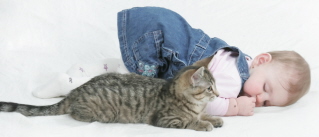|
|
Cats and Children -
Supervision is Key!
Cats that are not
introduced to children in early
kittenhood may have a difficult
time being comfortable around
them.
Do not leave
the
relationship between
cats
and children
to chance! Set ground rules from
the start and supervise all
interactions.

Why supervise?
Prevent one bad experience
resulting in a cat that avoids
all children at best, shows
aggression at worst.
|
The overall strategy is to
supervise the
cat
as he or she explores
the home. Praise the
all
behaviors
you
do
want to continue. Interrupt
any behavior you do NOT
want
and
redirect
to a
wanted behavior. |
What to do
-
Offer cat a
finger to sniff as a proper
greeting. Offer a food treat
to encourage the cat to
approach. Never go to the
cat. Ask the cat to come to
you. Never force any contact
or try to hold a cat against
its will.
-
Never grab, squeeze, chase, hit, or in any other
way scare or hurt the
cat.
No rough housing.
No lifting the
cat
by the belly, head,
or tail
or tail pulling.
Instead, sit on the ground
and hold the cat in your
lap. If you see signs of cat
tension, walk away.
-
Do not allow the cat
to play bite or scratch
you.
Instead use cat toys to play
interactive games that
direct the cat to pouncing
on the toy not you.
-
Do not move
quickly around the cat.
Sit quietly and watch the
cat without moving as the
cat eats a tasty meal.
Early Feline
Socialization -
3 to 8
weeks old
-
Sensitive period for
social learning.
Social play begins and
increases steadily.
Learns many social
skills.
-
Object play begins and
increases. Climbing,
and running begin.
Capable of complex
learning. Scratching and
predatory behavior
begins.
Early Feline
Socialization -
9 to 16
weeks old
American Association of
Feline Practitioners (AAFP)
Feline Behavior Guidelines
2004

|
|
|
"Helping you raise a fabulous feline
friend for life." |
|